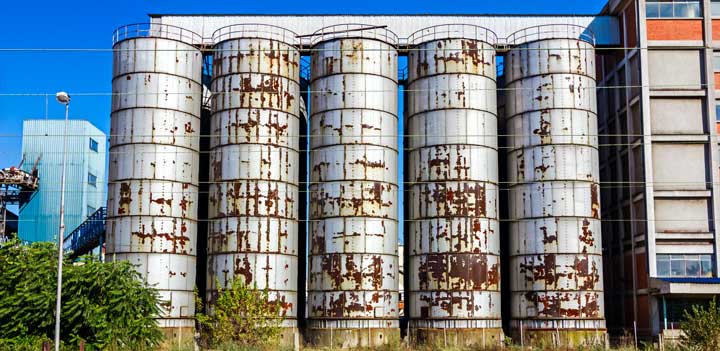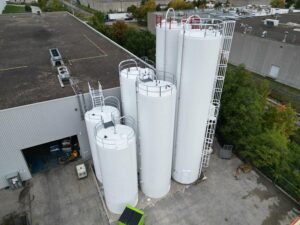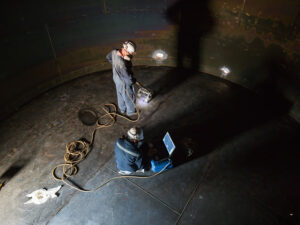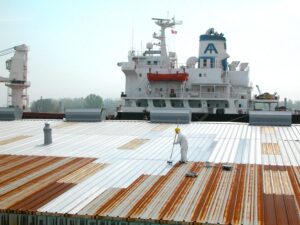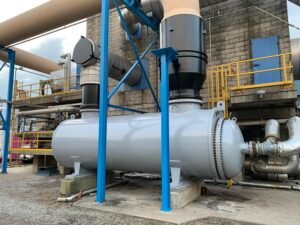The role of industrial painting in rust prevention and corrosion control cannot be overstated, as it plays a crucial part in maintaining the integrity and longevity of structures. This blog post will delve into the various aspects of this vital process, from its benefits to the types of paint used for effective protection.
As you explore this article, you’ll gain an understanding of how proper surface preparation is essential for successful corrosion control. Additionally, we will discuss application techniques that ensure optimal results when using industrial coatings.
Lastly, we’ll provide valuable maintenance tips to help extend the life of your industrial painting projects. Plant managers can make informed decisions on preserving their facility’s infrastructure by comprehending the role of industrial painting in rust prevention and corrosion control.
Table of Contents:
- Benefits of Industrial Painting for Rust Prevention
- Corrosion Control
- Types of Industrial Paint Used for Rust Prevention
- Preparation Steps for Industrial Painting Projects
- Application Techniques for Industrial Painting Projects
- 5 Maintenance Tips for Industrial Painting Projects
- FAQs in Relation to The Role of industrial Painting in Rust Prevention and Corrosion Control
- Conclusion
1. Benefits of Industrial Painting for Rust Prevention
Industrial painting is like armour for metal surfaces, protecting them from rust and corrosion and extending their lifespan.
- Durability: High-quality paints and coatings create a tough barrier against moisture, chemicals, abrasion, and impact damage, preventing rust formation.
- Cost-effective maintenance: Regularly applying protective coatings reduces the need for expensive repairs or replacements due to corrosion-related issues, saving you money in the long run.
- Aesthetic appeal: Freshly painted surfaces look more professional and promote a positive work environment for employees.
- Safety compliance: Industrial painting is an essential part of preventative measures required by safety regulations to prevent accidents related to corroded equipment or structures.
Choosing the right type of paint is crucial for optimal results in rust prevention, considering factors such as exposure conditions, substrate material, and desired finish appearance.
Corrosion Control
Don’t let rust eat away at your industrial equipment – invest in corrosion prevention to protect your assets and save money on costly repairs.
- Cathodic protection: Use an external electrical current to reduce corrosion rates.
- Anodic protection: Make the metal surface act as an anode to form a protective oxide layer.
- Inhibitors: Slow down or prevent corrosive reactions with chemical substances.
- VCI (Vapor Corrosion Inhibitor): Release vapour-phase molecules to form a protective film on exposed metallic surfaces.
At B.E.S.T Painting Ltd., we use high-quality industrial paints designed for rust prevention and corrosion protection to create a barrier between your equipment and the environment.
Consider factors such as metal type, environmental conditions, and exposure levels when selecting the appropriate industrial paint.
Work with a professional industrial painting company like B.E.S.T Painting Ltd. to implement effective corrosion control methods and safeguard your investment.
Types of Industrial Paint Used for Rust Prevention
Industrial paint is like armour for metal surfaces, protecting them from rust and corrosion.
There are several types of industrial paint available, each with its own unique properties and benefits:
- Epoxy: These coatings are tough as nails and can withstand harsh environments and chemicals.
- Polyurethane: Flexible and durable, polyurethane coatings are perfect for outdoor applications.
- Alkyd: Affordable and easy to apply, but may not offer the same level of protection as other options.
- Acrylic: Water-resistant and environmentally friendly, waterborne acrylic coatings are a great option for rust prevention.
- Chlorinated Rubber: Highly resistant to chemicals and water but limited in colour options and may have environmental concerns.
Choosing the right industrial paint is crucial for effective rust prevention and corrosion control. Consult with a professional like B.E.S.T. Painting Ltd to make an informed decision based on your unique needs.
Preparation Steps for Industrial Painting Projects
Proper preparation is key for successful industrial painting projects, including cleaning the surface, removing rust and corrosion, and applying a primer.
Clean the Surface
Dirty surfaces can ruin your paint job, so make sure to clean it thoroughly with abrasive blasting, power washing, or degreasing agents.
Remove Rust and Corrosion
Don’t let rust and corrosion ruin your project; remove it with mechanical or chemical treatments before painting.
Apply Primer
Primer is essential for adhesion and protection, so choose the right type, like epoxy, zinc-rich, or alkyd-based formulations.
Create Surface Profile
Optimal paint adhesion requires an appropriate surface profile, which can be achieved through abrasive blasting or mechanical means like grinding or sanding.
For more information on industrial painting projects, check out SSPC.
Application Techniques for Industrial Painting Projects
Choosing the right application technique for industrial painting projects is crucial for optimal results.
Brushing
Brushing is perfect for small areas or intricate surfaces where precision is required.
Rolling
Rolling is great for covering large areas with consistent coverage quickly.
Spraying
Spraying is fast and even, making it ideal for large areas and specialized coatings.
Airless Spraying
Airless spraying is effective for thick coatings and reduces overspray, making it perfect for large-scale projects.
Consider factors like the size of the area, type of paint, and specific requirements for your facility or equipment when selecting the right method.
5 Maintenance Tips for Industrial Painting Projects
Regular maintenance is crucial to ensure the longevity of your industrial painting project.
Inspect regularly: Schedule routine inspections of all painted surfaces, looking for signs of wear, damage, rust formation, or peeling paint.
Clean surfaces: Keep painted areas clean by removing dirt and debris that may accumulate over time.
Treat minor damages promptly: Repair small scratches or chips in the paint as soon as possible using appropriate touch-up materials like touch-up paints.
Maintain proper environmental conditions: Monitor humidity levels and temperature within your facility since extreme fluctuations can cause premature deterioration of coatings.
Avoid abrasive cleaning methods: Avoid using harsh chemicals or abrasive tools while cleaning painted surfaces; this could strip away layers of protection leading to corrosion exposure.
Note performance trends: Analyze historical data about previous painting projects at your plant/factory to identify trends and make informed decisions about maintenance schedules.
By following these maintenance tips, you can significantly extend the life of your industrial painting project and protect your investment.
Remember that regular inspections are vital in identifying potential issues early on, allowing for timely repairs or reapplications when necessary.
With proper care and attention, your painted surfaces will remain protected against rust formation and corrosion damage for years to come.
FAQs in Relation to The Role of industrial Painting in Rust Prevention and Corrosion Control
How does painting prevent rust?
Painting creates a barrier between metal surfaces and environmental factors, like moisture and oxygen, preventing the chemical reaction that causes rust formation.
Is painting effective in preventing iron from rusting?
Yes, painting creates an impermeable seal on iron surfaces, blocking exposure to water and air, and inhibiting oxidation reactions responsible for rust development.
Can painting metal prevent corrosion?
Applying paint or specialized corrosion-inhibiting coatings creates a physical barrier between the metal surface and corrosive agents, like moisture or chemicals, ensuring long-lasting protection with regular inspection and maintenance.
Conclusion
The Importance of Industrial Painting for Rust Prevention and Corrosion Control
Industrial painting protects plants and factories from rust and corrosion damage.
Maintenance managers can ensure that their facilities remain protected using the right paint type, proper preparation techniques, and application methods.
Regular maintenance checks are also important to keep painted surfaces in good condition.
Investing in industrial painting projects is a cost-effective way to protect assets from deterioration due to environmental factors such as moisture, chemicals, or temperature changes.
With these tips, plant or factory managers can take proactive steps towards preventing rust and corrosion while extending the lifespan of their equipment.
For more information on industrial painting and rust prevention, check out these credible sources:
- SSPC: The Society for Protective Coatings
- B.E.S.T. Painting Ltd.
- Corrosionpedia

